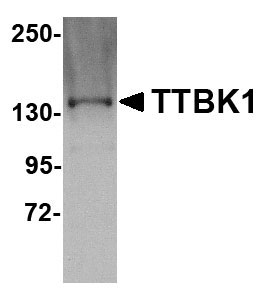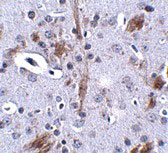TTBK1 Antibody
- SPECIFICATION
- CITATIONS
- PROTOCOLS
- BACKGROUND

Application
| WB, IHC-P, IF, E |
|---|---|
| Primary Accession | Q5TCY1 |
| Other Accession | Q5TCY1, 97203020 |
| Reactivity | Human, Mouse |
| Host | Rabbit |
| Clonality | Polyclonal |
| Isotype | IgG |
| Calculated MW | Predicted: 145, 151 kDa Observed: 140 kDa |
| Application Notes | TTBK1 antibody can be used for detection of TTBK1 by Western blot at 1 µg/mL. Antibody can also be used for immunohistochemistry starting at 2.5 µg/mL. For immunofluorescence start at 20 µg/mL. |
| Gene ID | 84630 |
|---|---|
| Target/Specificity | TTBK1; Multiple isoforms of TTBK1 are known to exist. This antibody is predicted to not cross-react with TTBK2. |
| Reconstitution & Storage | TTBK1 antibody can be stored at 4℃ for three months and -20℃, stable for up to one year. As with all antibodies care should be taken to avoid repeated freeze thaw cycles. Antibodies should not be exposed to prolonged high temperatures. |
| Precautions | TTBK1 Antibody is for research use only and not for use in diagnostic or therapeutic procedures. |
| Name | TTBK1 |
|---|---|
| Synonyms | BDTK, KIAA1855 |
| Function | Serine/threonine kinase which is able to phosphorylate TAU on serine, threonine and tyrosine residues. Induces aggregation of TAU. |
| Cellular Location | Cytoplasm. |
| Tissue Location | Expressed in the brain, particularly in cortical and hippocampal neurons. Weakly expressed in spinal cord and testis. No expression in adipose tissue, bladder, cervix, colon, esophagus, heart, kidney, liver, lung, ovary, placenta, prostate, skeletal muscle, small intestine, spleen, testis, thymus, thyroid or trachea |

Thousands of laboratories across the world have published research that depended on the performance of antibodies from Abcepta to advance their research. Check out links to articles that cite our products in major peer-reviewed journals, organized by research category.
info@abcepta.com, and receive a free "I Love Antibodies" mug.
Provided below are standard protocols that you may find useful for product applications.
Background
TTBK1 Antibody: Tau tubulin kinase (TTBK1) belongs to the casein kinase 1 superfamily and is involved in the phosphorylation of specific serine/threonine residues in paired helical filaments of the tau protein. It is specifically expressed in the brain and induces tau aggregation in human neuronal cells in a dose-dependent manner. TTBK1 levels have been found to be upregulated in the brains of Alzheimer's disease (AD) patients, and mice expressing human TTBK1 protein showed significant age-dependent memory impairment. These mice displayed increased levels of the CDK5 activators p25 and p35, and reduced levels of the NMDA receptor types 2B and 2D, suggesting that TTBK1 may play a role in memory dysfunction in AD patients.
References
Sato S, Cerny RL, Bueschner JL, et al. Tau-tubulin kinase 1 (TTBK1), a neuron-specific tau kinase candidate, is involved in tau phosphorylation and aggregation. J. Neurochem. 2006; 98:1573-84.
Sato S, Xu J, Okuyama S, et al. Spatial learning impairment, enhanced CDK5/p35 activity, and downregulation of NMDA receptor expression in transgenic mice expressing tau-tubulin kinase 1. J. Neurosci. 2008; 28:14511-21.
If you have used an Abcepta product and would like to share how it has performed, please click on the "Submit Review" button and provide the requested information. Our staff will examine and post your review and contact you if needed.
If you have any additional inquiries please email technical services at tech@abcepta.com.













 Foundational characteristics of cancer include proliferation, angiogenesis, migration, evasion of apoptosis, and cellular immortality. Find key markers for these cellular processes and antibodies to detect them.
Foundational characteristics of cancer include proliferation, angiogenesis, migration, evasion of apoptosis, and cellular immortality. Find key markers for these cellular processes and antibodies to detect them. The SUMOplot™ Analysis Program predicts and scores sumoylation sites in your protein. SUMOylation is a post-translational modification involved in various cellular processes, such as nuclear-cytosolic transport, transcriptional regulation, apoptosis, protein stability, response to stress, and progression through the cell cycle.
The SUMOplot™ Analysis Program predicts and scores sumoylation sites in your protein. SUMOylation is a post-translational modification involved in various cellular processes, such as nuclear-cytosolic transport, transcriptional regulation, apoptosis, protein stability, response to stress, and progression through the cell cycle. The Autophagy Receptor Motif Plotter predicts and scores autophagy receptor binding sites in your protein. Identifying proteins connected to this pathway is critical to understanding the role of autophagy in physiological as well as pathological processes such as development, differentiation, neurodegenerative diseases, stress, infection, and cancer.
The Autophagy Receptor Motif Plotter predicts and scores autophagy receptor binding sites in your protein. Identifying proteins connected to this pathway is critical to understanding the role of autophagy in physiological as well as pathological processes such as development, differentiation, neurodegenerative diseases, stress, infection, and cancer.




